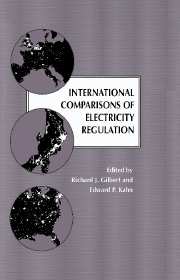Book contents
- Frontmatter
- Contents
- Preface
- International Comparisons of Electricity Regulation
- 1 Introduction: International comparisons of electricity regulation
- 2 Regulation, public ownership and privatisation of the English electricity industry
- 3 How should it be done? Electricity regulation in Argentina, Brazil, Uruguay, and Chile
- 4 From club-regulation to market competition in the Scandinavian electricity supply industry
- 5 Competition and institutional change in U.S. electric power regulation
- 6 The Japanese electric utility industry
- 7 Regulation of the market for electricity in the Federal Republic of Germany
- 8 The evolution of New Zealand's electricity supply structure
- 9 Regulation of electric power in Canada
- 10 The French electricity industry
- 11 The Yugoslav electric power industry
- Index
1 - Introduction: International comparisons of electricity regulation
Published online by Cambridge University Press: 21 March 2010
- Frontmatter
- Contents
- Preface
- International Comparisons of Electricity Regulation
- 1 Introduction: International comparisons of electricity regulation
- 2 Regulation, public ownership and privatisation of the English electricity industry
- 3 How should it be done? Electricity regulation in Argentina, Brazil, Uruguay, and Chile
- 4 From club-regulation to market competition in the Scandinavian electricity supply industry
- 5 Competition and institutional change in U.S. electric power regulation
- 6 The Japanese electric utility industry
- 7 Regulation of the market for electricity in the Federal Republic of Germany
- 8 The evolution of New Zealand's electricity supply structure
- 9 Regulation of electric power in Canada
- 10 The French electricity industry
- 11 The Yugoslav electric power industry
- Index
Summary
What is so special about electricity?
As the sun goes down in the evening sky, cities around the world are illuminated in electric light. Photos from satellites orbiting the earth show clearly the outlines of modern society etched against the darkness. We show these pictures on the cover of this book to underline the special role played by electricity in the contemporary world.
Yet, although electricity is a universal feature of modern society, should we expect the firms that produce this universal commodity to be organized along broadly similar lines internationally? There are prima facie arguments on both sides. On the one hand, common factors of production and technological history suggest broad institutional similarities. On the other hand, the influence of particular national traditions, political culture, and experience argue for differences. There is no definitive answer to this question, but it is becoming more and more interesting for those who follow institutional developments in the industry and those who seek to improve economic efficiency in the electricity sector.
The electricity industry in many countries is experiencing a wave of structural change. Much of this we document here. It is not immediately clear, however, why reorganization of this industry is occurring now, what is the driving force, and whether there will be an international convergence in its structure. Our inquiry will help to address these large and somewhat mysterious questions.
The research represented by this volume is a collaborative effort of academic investigators from around the world. Each chapter describes the electricity industry and its regulation in one country (or several geographically proximate countries).
- Type
- Chapter
- Information
- International Comparisons of Electricity Regulation , pp. 1 - 24Publisher: Cambridge University PressPrint publication year: 1996
- 10
- Cited by

